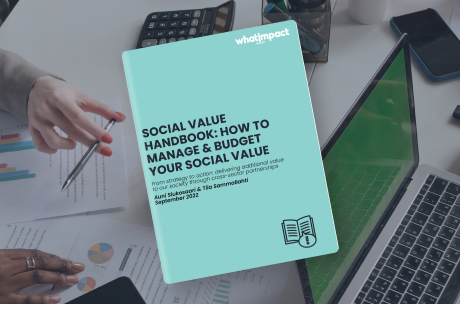Sustainable supply chain practices play a big part in social value management. Suppliers have various types of impact on the success and desirability of a company. Policies and standards related to social and environmental value, as well as governance practices create new demands for supplier management. Whatimpact operate in a diverse world of partnerships: enhancing collaboration between the third and private sector through our matchmaking platform.
Currently, most enterprises and larger companies have initiatives to increase the number of SMEs and VCSEs (voluntary organisations, charities, social enterprises) in their supply chain. They do this to increase innovation in their organisations, learn skills and capabilities outside of normal scope, and deliver social value at a local level by buying locally and from those organisations whose impact goes beyond the core product or service.
When talking about sustainable supply chain principles working with SMEs and VCSEs are a key part of the equation. We wish to list some practical tips to apply when looking to widen and diversify a company’s supply chain. It might be surprising, how small things can prohibit partnerships from happening or have a negative impact on the smaller supplier’s business. In the end, we all wish to make mutually beneficial business and successful partnerships.
- Equal partnership
The size of the buyer in comparison to the supplier or the size of the contract in comparison to the entire business can have a negative impact to the supplier if the buyer doesn’t braise equal rules and practices. The larger buyer often wishes to change the contract, timelines, and how things are run in the middle of the contract period, referring to their buying power. It is natural to expect changes, but the supplier should consider the implications and compensate for any extra costs occurring from the changes.
-
Reasonable and relevant due diligence and security protocols
Various standards and accreditations used and acquired by larger organisations create complex protocols and practices to mitigate e.g. cyber security. If these protocols do not consider the limitations of SME/VCSEs to be able to meet requirements, doing business becomes impossible. We have seen practices where the highest level of cyber security is demanded for a products or service, where there is no data to protect and the risk could have been mitigated through collaboration. We have seen startups and VCSEs not being chosen as partners as the organisations could not pass due diligence due to their operational age being less than 3 years or their registration status was not the right kind. Forward looking companies acknowledge the diversity of suppliers in their governance standards .
-
Fair payment terms
One-sided, long payment times and complex payment terms is a global and national challenge in supply chains. Regardless of their type, smaller organisations cannot wait 60 or 90 days to get paid. Late payments are very common even if payment terms have been agreed to be less. If smaller organisations leave an invoice unpaid or stalls payment, consequences can be critical, with partnerships ceasing to exist. Today, all organisations use advanced accountancy and invoicing technology, which allow swift and timely payments. Each company, especially larger ones, should think of their financial diligence and practices as a reflection of their service quality and ethics. If you have the power, you also have the responsibility.
-
Fair trading practices
Startups and VCSEs have many times exciting knowledge, innovative products and services, which makes them experts of some particular field. Having larger, reputable clients is something these organisations seek for and are willing to put the effort into acquiring them. Sales negotiations with large organisations are sometimes lengthy, up to 6-12months. The process can entail the expert companies giving advice and presentations, granting access to materials, attending events and granting free trials. If the intention to buy is not there, this kind of a process is not feasible for smaller organisations.
-
Social value is a shared responsibility
Delivery of social value is mandatory for all government tenders. Main contractors gain benefit from suppliers’ social value programmes, therefore social value activities have become important criteria to form partnerships. Smaller, local organisations and social impact companies inherently deliver social value, but cannot be responsible for all social value projects. It is still the main contractor’s responsibility to deliver environmental, social and economic value, through activities delivered by their employees.
whatimpact.com is the only platform in the UK which is built to help you plan, deliver and report on social value, aligned with government social value requirements – to speak to our team about how we can help you with your social value management, contact us here.





